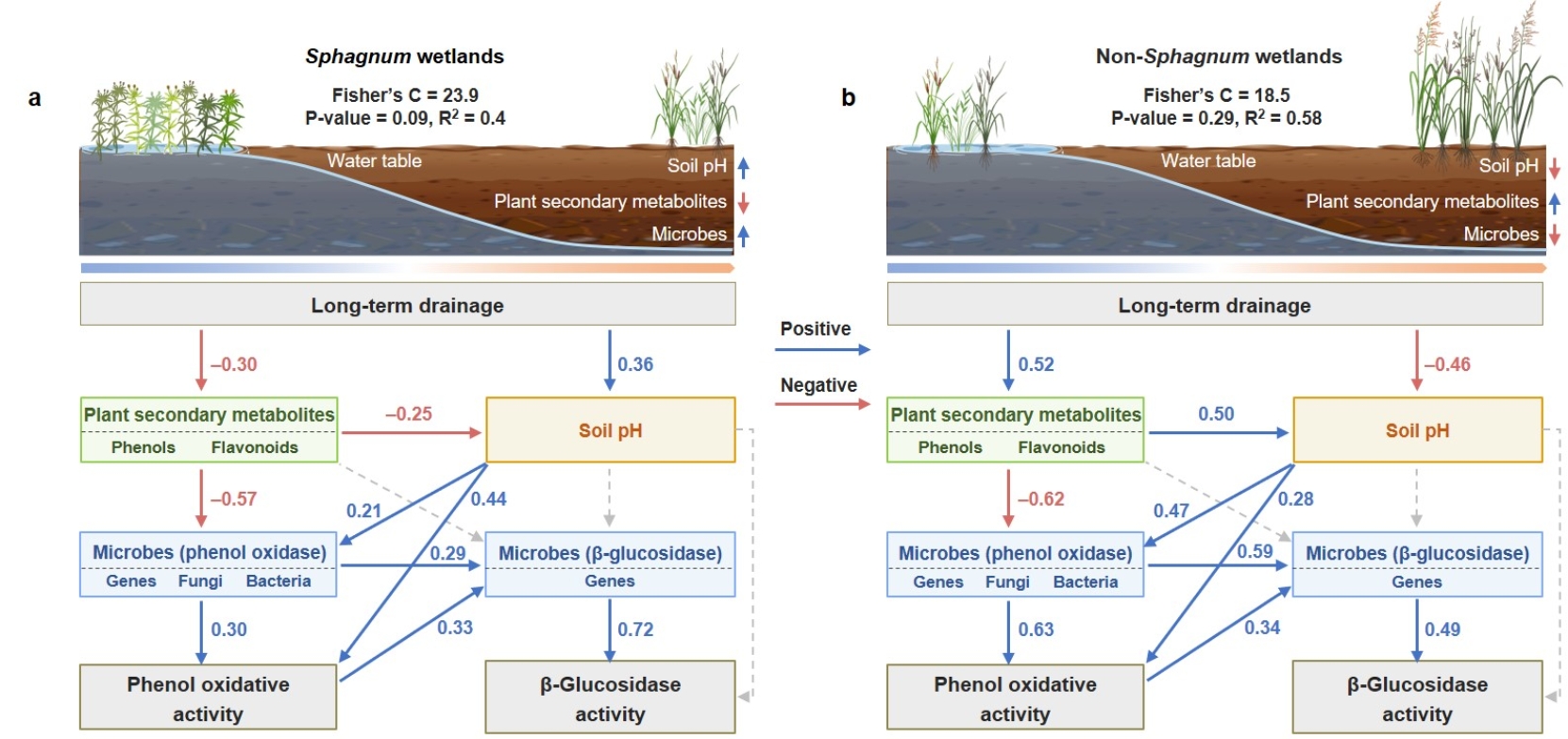Recent research led by Prof. FENG Xiaojuan from the Institute of Botany, Chinese Academy of Sciences has reconciled the divergent responses of carbon-degrading enzymes to wetland drainage. The study finds that while oxygen exposure generally increases phenol oxidative activity during short-term drainage, enzymatic response to long-term drainage diverges in Sphagnum versus non-Sphagnum wetlands due to varied vegetational shifts.
The study was published online in Nature Climate Change on August 15, 2024
The tremendous carbon storage in wetlands is often attributed to inhibited enzyme (particularly phenol oxidase) activity under oxygen-deprived conditions. Drainage induced by climate change and human activities is expected to increase oxygen availability, potentially resulting in a surge of phenol oxidative activity and carbon decomposition. However, phenol oxidase response to field drainage is highly uncertain, constraining our ability to predict wetland carbon–climate feedbacks.
To address this knowledge gap, the researchers conducted a nationwide, pairwise survey of drained wetlands across China that had experienced long-term (15–55 years) artificial drainage. The survey involved replicated pairs of waterlogged vs. drained soils in 30 wetlands, including 14 Sphagnum and 16 non-Sphagnum wetlands. Combined with literature data and laboratory simulations, this study compared the response of phenol oxidative activity to drainage at different timescales in different wetland types.
The study finds that while short-term drainage generally increases phenol oxidative activity, its response to long-term drainage diverges in Sphagnum versus non-Sphagnum wetlands. By employing soil metagenomic and plant metabolic analyses, the study further demonstrates that long-term drainage is linked to increased plant secondary metabolites (especially antimicrobial phenols) and decreased phenol oxidase-producing microbes in soils of the non-Sphagnum wetlands. In contrast, in Sphagnum wetlands, drainage is linked to replacement of antimicrobial Sphagnum by vascular plants, which increases phenol oxidase-producing microbes and phenol oxidative activity with cascading effects on hydrolytic enzymes.
Overall, these results reconcile the contrasting changes of phenol oxidative activity following wetland drainage at different timescales and demonstrate that plant-microbe interactions rather than oxygen availability underpin the divergent responses of phenol oxidative activity to field drainage in Sphagnum vs. non-Sphagnum wetlands.
“Our study highlights that trait-based plant dynamics are pivotal to decipher wetland carbon dynamics and feedback to climate change under shifting hydrological regimes. Incorporating this novel mechanism into models will improve prediction of wetland soil organic carbon dynamics.” said Prof. Feng.
This study was supported financially by the National Natural Science Foundation of China (grant nos. 42025303, 31988102, 42230501).

Pathways regulating contrasting enzymatic responses to drainage in Sphagnum versus
non-Sphagnum wetlands.
Reference:
Zhao, Y.P., Liu, C.Z., Kang, E.Z., Li X.Q., Deng, Y. & Feng X.J.* (2024) Plant–microbe interactions underpin contrasting enzymatic responses to wetland drainage. Nature Climate Change. https://doi.org/10.1038/s41558-024-02101-3.
Recent research led by Prof. FENG Xiaojuan from the Institute of Botany, Chinese Academy of Sciences has reconciled the divergent responses of carbon-degrading enzymes to wetland drainage. The study finds that while oxygen exposure generally increases phenol oxidative activity during short-term drainage, enzymatic response to long-term drainage diverges in Sphagnum versus non-Sphagnum wetlands due to varied vegetational shifts.
The study was published online in Nature Climate Change on August 15, 2024
The tremendous carbon storage in wetlands is often attributed to inhibited enzyme (particularly phenol oxidase) activity under oxygen-deprived conditions. Drainage induced by climate change and human activities is expected to increase oxygen availability, potentially resulting in a surge of phenol oxidative activity and carbon decomposition. However, phenol oxidase response to field drainage is highly uncertain, constraining our ability to predict wetland carbon–climate feedbacks.
To address this knowledge gap, the researchers conducted a nationwide, pairwise survey of drained wetlands across China that had experienced long-term (15–55 years) artificial drainage. The survey involved replicated pairs of waterlogged vs. drained soils in 30 wetlands, including 14 Sphagnum and 16 non-Sphagnum wetlands. Combined with literature data and laboratory simulations, this study compared the response of phenol oxidative activity to drainage at different timescales in different wetland types.
The study finds that while short-term drainage generally increases phenol oxidative activity, its response to long-term drainage diverges in Sphagnum versus non-Sphagnum wetlands. By employing soil metagenomic and plant metabolic analyses, the study further demonstrates that long-term drainage is linked to increased plant secondary metabolites (especially antimicrobial phenols) and decreased phenol oxidase-producing microbes in soils of the non-Sphagnum wetlands. In contrast, in Sphagnum wetlands, drainage is linked to replacement of antimicrobial Sphagnum by vascular plants, which increases phenol oxidase-producing microbes and phenol oxidative activity with cascading effects on hydrolytic enzymes.
Overall, these results reconcile the contrasting changes of phenol oxidative activity following wetland drainage at different timescales and demonstrate that plant-microbe interactions rather than oxygen availability underpin the divergent responses of phenol oxidative activity to field drainage in Sphagnum vs. non-Sphagnum wetlands.
“Our study highlights that trait-based plant dynamics are pivotal to decipher wetland carbon dynamics and feedback to climate change under shifting hydrological regimes. Incorporating this novel mechanism into models will improve prediction of wetland soil organic carbon dynamics.” said Prof. Feng.
This study was supported financially by the National Natural Science Foundation of China (grant nos. 42025303, 31988102, 42230501).

Pathways regulating contrasting enzymatic responses to drainage in Sphagnum versus
non-Sphagnum wetlands.
Reference:
Zhao, Y.P., Liu, C.Z., Kang, E.Z., Li X.Q., Deng, Y. & Feng X.J.* (2024) Plant–microbe interactions underpin contrasting enzymatic responses to wetland drainage. Nature Climate Change. https://doi.org/10.1038/s41558-024-02101-3.
